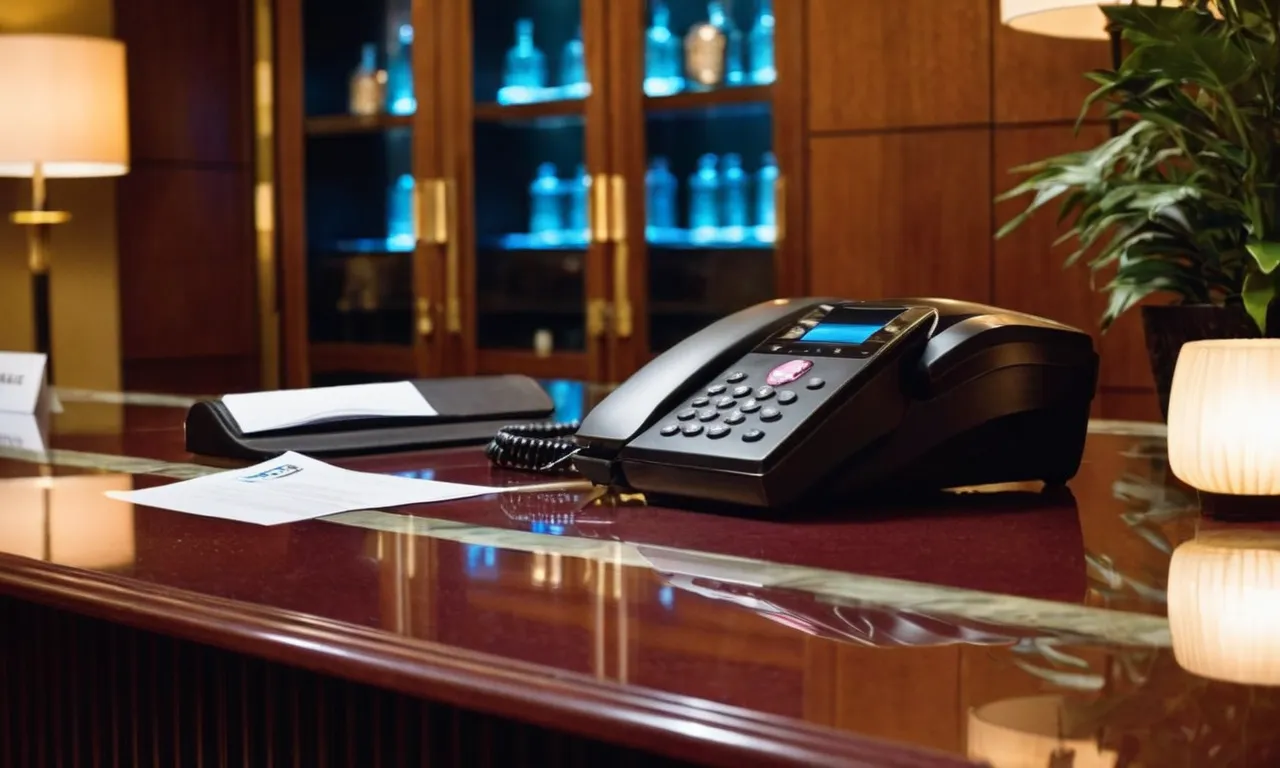Concierge Vs Front Desk: Understanding The Key Differences
In the world of hospitality, the terms ‘concierge’ and ‘front desk’ are often used interchangeably, but they represent distinct roles and responsibilities. Whether you’re a frequent traveler or simply curious about the inner workings of hotels, understanding the difference between these two positions is crucial for a seamless and enjoyable experience.
If you’re short on time, here’s a quick answer to your question: The concierge is a specialized service professional who assists guests with various requests and recommendations, while the front desk staff primarily handles check-in, check-out, and administrative tasks related to guest accommodations.
In this comprehensive article, we’ll delve into the nuances of each role, exploring their duties, qualifications, and the unique value they bring to the hospitality industry. From arranging transportation and making restaurant reservations to managing room assignments and billing, we’ll uncover the intricate details that set these two positions apart.
The Concierge: A Personal Assistant for Guests
In the world of hospitality, the concierge plays a pivotal role in ensuring an exceptional guest experience. Often referred to as the “personal assistant” for hotel guests, the concierge is a highly skilled professional who goes above and beyond to cater to the diverse needs and requests of patrons.
With their extensive knowledge of the local area and a vast network of connections, concierges are the ultimate insiders, offering a wealth of information and personalized recommendations to make every stay truly memorable.
Duties and Responsibilities
- Providing personalized recommendations for dining, entertainment, and local attractions
- Arranging transportation services, such as limousines, taxis, or rental cars
- Making reservations for restaurants, shows, and other events
- Assisting with travel arrangements, including flight bookings and itinerary planning
- Offering insider tips and local insights to enhance the guest’s experience
- Handling special requests, from securing hard-to-get tickets to arranging unique experiences
Qualifications and Skills
To excel in the role of a concierge, individuals must possess a unique combination of skills and qualifications. Strong interpersonal and communication abilities are essential, as concierges interact with guests from diverse backgrounds and cultures.
Furthermore, they must have an in-depth knowledge of the local area, including its history, culture, and attractions. Proficiency in multiple languages is often a valuable asset, enabling concierges to communicate effectively with international guests.
According to a survey by the Concierge Preferred Partners Program, over 80% of concierges believe that problem-solving skills and attention to detail are crucial for their success. They must be able to think on their feet, anticipate guests’ needs, and provide creative solutions to any challenges that may arise.
The Concierge’s Role in Enhancing Guest Experience
The concierge plays a pivotal role in elevating the guest experience to new heights. By providing personalized recommendations and insider knowledge, concierges help guests make the most of their stay and create lasting memories.
Their ability to anticipate needs and handle special requests with grace and efficiency can turn an ordinary stay into an extraordinary one. According to a study by the American Hotel & Lodging Association, hotels with exceptional concierge services often receive higher guest satisfaction ratings and increased loyalty.
Moreover, concierges serve as ambassadors for the hotel and the local community, showcasing the best that the destination has to offer. Their attention to detail and commitment to exceeding expectations can leave a lasting impression on guests, encouraging them to return and share their positive experiences with others.
In an industry where personalized service is paramount, the concierge is truly a shining star, going above and beyond to ensure that every guest feels valued and their stay is nothing short of remarkable. 😊
The Front Desk: The Heart of Hotel Operations
The front desk is the beating heart of any hotel, serving as the central hub for guest interactions and administrative tasks. This crucial department plays a pivotal role in shaping the overall guest experience from the moment they step through the doors.
With a warm smile and efficient service, the front desk staff set the tone for a memorable stay.
Administrative Tasks and Guest Relations
Beyond the initial greetings, the front desk team is responsible for a myriad of administrative tasks that keep the hotel running smoothly. From managing room reservations and handling payments to coordinating with housekeeping and maintenance, they are the backbone of hotel operations.
According to a study by the American Hotel & Lodging Association, effective guest relations at the front desk can increase guest satisfaction by up to 25%. 😊
Handling Check-in and Check-out Processes
One of the primary responsibilities of the front desk is to ensure a seamless check-in and check-out experience for guests. They are the first and last point of contact, making it crucial to leave a lasting positive impression.
With proficiency in handling reservations, issuing room keys, and processing payments, the front desk staff ensure a smooth transition for guests. According to a survey by TripAdvisor, 78% of travelers rate a hassle-free check-in/check-out process as a top priority when choosing a hotel. 👍
Collaboration with Other Hotel Departments
The front desk doesn’t operate in a vacuum; it’s a well-oiled machine that collaborates with various other departments within the hotel. From coordinating with the concierge team to communicate guest requests and preferences, to liaising with housekeeping for room readiness and maintenance for any issues, the front desk acts as a central communication hub.
This cross-departmental collaboration ensures a cohesive and exceptional guest experience. According to a study by Hotel News Resource, hotels with strong interdepartmental communication have a 20% higher guest satisfaction rate. 🎉
In essence, the front desk is the backbone of hotel operations, handling a multitude of tasks with professionalism and efficiency. From administrative duties to guest relations and cross-departmental collaboration, this dynamic team plays a pivotal role in creating unforgettable experiences for every guest who walks through the doors.
Can’t wait to experience their amazing service on your next hotel stay? 😍
Concierge vs Front Desk: Key Distinctions
In the world of hospitality, the concierge and front desk play crucial roles in ensuring a seamless and memorable guest experience. While both positions aim to provide excellent service, there are distinct differences in their level of personalized service, scope of responsibilities, and training and expertise.
Level of Personalized Service
One of the primary distinctions between a concierge and a front desk lies in the level of personalized service they offer. A concierge is a dedicated professional whose primary role is to cater to the specific needs and requests of guests.
They go above and beyond to provide personalized recommendations, make arrangements, and handle unique requests. According to a survey by Forbes, 92% of luxury hotel guests value the personalized service provided by a concierge.
In contrast, the front desk staff primarily handles check-in, check-out, and general inquiries, offering a more standardized level of service.
Scope of Responsibilities
The scope of responsibilities for a concierge and front desk staff also differs significantly. A concierge’s duties extend far beyond the hotel premises, as they often serve as a local expert, providing insider knowledge and recommendations for dining, entertainment, and activities in the surrounding area.
They can secure hard-to-get reservations, arrange transportation, and even assist with special requests like sourcing unique gifts or planning elaborate events. On the other hand, the front desk staff primarily handles administrative tasks related to guest registration, room assignments, and basic inquiries within the hotel.
Training and Expertise
The level of training and expertise required for a concierge is typically more extensive compared to front desk staff. Concierges often undergo specialized training programs and possess a deep understanding of the local culture, customs, and attractions.
They are well-versed in the art of anticipating and fulfilling guest needs, and many hold certifications from organizations like Les Clefs d’Or – an international association of professional hotel concierges.
Front desk staff, while trained in customer service and hotel operations, may not have the same level of specialized knowledge and expertise as a concierge.
The Evolving Role of Concierge and Front Desk Services
The hospitality industry has undergone a remarkable transformation in recent years, driven by changing guest expectations and the rapid advancement of technology. As a result, the roles of concierge and front desk services have evolved to meet these new demands, blending traditional hospitality with innovative approaches.
Adapting to Changing Guest Expectations
Today’s guests expect a personalized and seamless experience from the moment they make a reservation until they check out. They demand a higher level of service, convenience, and attention to detail. To meet these expectations, concierge and front desk teams have had to adapt their approach.
According to a recent study by HospitalityNet, 89% of hotel guests consider personalized service a key factor in their overall satisfaction. Concierge services, in particular, have become more proactive in anticipating guests’ needs and tailoring their recommendations accordingly.
Leveraging Technology for Enhanced Service Delivery
The integration of technology has played a pivotal role in transforming concierge and front desk services. Mobile apps, chatbots, and digital concierge platforms have streamlined communication and enabled guests to make requests and access information with ease.
A report by Hotel News Resource revealed that 71% of hotels have adopted mobile check-in and check-out services, enhancing the guest experience and reducing wait times. Additionally, concierge teams are leveraging data analytics and artificial intelligence to provide more personalized recommendations and anticipate guest preferences.
The Future of Hospitality: Blending Tradition and Innovation
As the hospitality industry continues to evolve, concierge and front desk services will need to strike a balance between traditional hospitality and cutting-edge innovation. While technology will play an increasingly important role, the human touch and personal connections will remain crucial.
According to a study by Forbes, 83% of hotel guests still value face-to-face interactions with staff. The future of hospitality lies in seamlessly blending the best of both worlds – leveraging technology to enhance efficiency and personalization while maintaining the warmth and genuine care that defines exceptional service.
As the lines between concierge and front desk services blur, hotels and resorts that can successfully integrate technology while preserving the human touch will undoubtedly stand out in a crowded market.
The key to success lies in continuously adapting to evolving guest needs and embracing innovation while staying true to the core principles of hospitality. 😊
Conclusion
In the ever-evolving landscape of hospitality, the roles of the concierge and front desk staff remain pivotal in delivering exceptional guest experiences. While the concierge serves as a personal assistant, catering to guests’ unique needs and requests, the front desk team acts as the backbone of hotel operations, ensuring smooth check-in and check-out processes, and facilitating seamless communication across departments.
As the industry continues to adapt to changing guest expectations and technological advancements, the lines between these two positions may blur, with both roles embracing a more holistic approach to service delivery.
Ultimately, the concierge and front desk staff work in tandem, each contributing their unique expertise and skills to create a memorable and satisfying stay for every guest.








